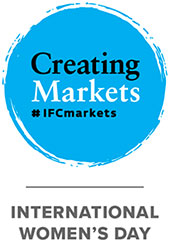Entrepreneurship by women is good for business and essential for economic growth. That’s why IFC works with the private sector to expand access to capital and provide training for women entrepreneurs in areas such as business management and leadership. To read about IFC’s initiatives, visit www.ifc.org/gender.
 Across the world, only 55 percent of women participate in the paid labor force—and those with paid work earn up to one-third less than men. Women own or run just 30 percent of small and medium enterprises in developing countries, and they’re largely shut out of capital markets.
Across the world, only 55 percent of women participate in the paid labor force—and those with paid work earn up to one-third less than men. Women own or run just 30 percent of small and medium enterprises in developing countries, and they’re largely shut out of capital markets.
But research shows that increasing women’s participation in the economy—as employees, entrepreneurs, and business leaders—would boost economic output and benefit generations to come. Women earners spend more on food and education than men do, and that introduces opportunities to lift their families and communities out of poverty.
This is just one of the reasons that IFC and the World Bank work to empower women in developing countries—not just on International Women’s Day, but on every day of the year.
IFC works closely with the World Bank on several initiatives. Last year, the organizations launched the Women Entrepreneurs Finance Initiative, or We-Fi, a platform that aims to enable more than $1 billion in financing to improve access to capital, provide technical assistance, and invest in projects that support women and women-led SMEs.
In 2017 IFC also released the report “Tackling Childcare: The Business Case for Employer-Supported Childcare,” which shows how companies and employees can mutually benefit when firms offer childcare options. Lack of access to childcare is a key barrier to women’s participation in the labor force. The report drew from research conducted by Women, Business and the Law, a joint initiative of the World Bank and IFC, surveying childcare regulations across 50 countries.
More recently, IFC has examined differences in the way men and women participate in ride-hailing—particularly in emerging markets. The report shows how the new “sharing economy” affects women's work and mobility, and how companies can ensure women's equal participation and gain.
By creating opportunities for women to transform the global economy, the World Bank Group brings the world closer to achieving lasting poverty reduction, security, and shared prosperity—every day of the year.
Read more about IFC’s work toward gender equality at www.ifc.org/gender.
Follow the conversation: #IFCmarkets
Published in March 2018
This story is part of a series on IFC’s work to help create markets that give new opportunities to people in developing countries. These innovative approaches have helped solve some of the largest problems in countries or, sometimes, entire regions.